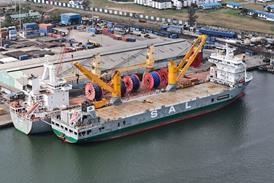Dennis Mottola, global logistics consultant, explains to David Kershaw why he is positive about the outlook for the logistics industry, despite a widespread need for modernisation.

“I believe the project cargo industry is steadily waking up to the fact that it needs to innovate. We need to transform the way that we do business if we hope to be successful together,” explained Dennis Mottola, global logistics consultant.
Mottola, who spent 21 years as corporate manager of logistics at Bechtel, said that logistics service providers that serve EPCs and OEMs need to adopt a level of automation and innovation that we see and use in our daily lives.
An example of such innovation is G2 Ocean’s successful trial of CargoX’s smart bill of lading (Smart B/L) solution. Having shipped several breakbulk loads from China to Peru, G2 Ocean said the pilot was an important step towards retiring the antiquated paper bill of lading.
“Leif Arne Strømmen is over at G2 Ocean in the position of vice president of innovation – I view that as a positive thing. Very few carriers have demonstrated the vision to have a senior management innovation position,” said Mottola.
Commitment
DHL has also shown a strong commitment to applying technology and innovation solutions to supply chain and logistics with the opening of a third innovation centre. This one is located in the US outside of Chicago. Eventually, we will see these types of solutions applied in the project cargo sector by DHL and others that recognise the opportunities for improving safety, cargo handling efficiencies, and increasing the certainty of positive outcomes they deliver.
“I know that many EPCs are investing heavily in an enterprise-wise digitalisation effort in order to make better use of their data,” he added. “It is helping to create a better overall picture of the business, and to identify where smarter, data-driven decision-making opportunities are possible through a more integrated and holistic view of that data.
“Since I retired from Bechtel, I have found that a lot of different project cargo shippers have opened up to me about shared experiences. Most are tackling the same challenges – they need better visibility and access to their data in order to: improve project cost estimates; to anticipate issues before they occur; to understand our market better; and to identify where its strengths and weaknesses are.”
I know that many EPCs are investing heavily in an enterprise-wise digitalisation effort in order to make better use of their data...
- Dennis Mottola, global logistics consultant.
Meanwhile, Mottola said he has been working as an advisor to an organisation called e2log – a Houston-based firm that has developed a digital platform to coordinate the purchase of logistics services for shipments of heavy and out-of-gauge cargoes.
“e2log’s aspiration is to digitalise a disorderly and inconsistent process that still runs manually on e-mails, attachments and spreadsheets. There is an urgent need for a coherent process that is digital where all related data is linked and easily accessible to enable smart buying decisions.
“There is pressure on every company in the industry, whether you are a shipper or a logistics services provider. Organisations are starting to recognise that it is vitally important to have control over your data – it is crucial for improving efficiencies through analytics while enhancing the ability to capture business, or to enable intelligent decisions that have cost and risk implications.”
Mottola believes that logistics service providers would do well to adopt a data-driven approach. “When logistics service providers came calling for business, few based their approach on ‘why choose my service’ using performance data. They were often void of critical data about their businesses that they ought to be wowing customers with – data such as on-time and damage-free performance, to name a few,” he said.
Working together
This type of information would help to set the service provider apart in a crowded marketplace. However, Mottola noted that this data-driven transition cannot happen in isolation – shippers and the logistics supply chain must work together if they are to sustain and elevate their activities in the future.
“I am optimistic that we will see more solutions that are aimed at that specific target... but service providers and shippers will need to have their data in order.” Companies that adopt a joined-up approach and work together will be the ones that are successful, he believes.
Other perennial challenges for the project logistics industry have been talent recruitment and retention. At his base in Houston, Mottola believes that great strides have been taken with regard to drawing new people into the business.
“Over the past 10-15 years, I have seen more and more engagement with the academic community in the USA, particularly in the Houston and New Orleans areas. It is acutely needed because of the competition for the best supply chain/logistics graduates, and to replenish the loss of talent through retirement of an older generation of project logistics know-how.”
He said that universities, junior colleges and even high schools are reporting increased interest in logistics and supply chain programmes.
“I believe the outreach programmes to universities are working, as evidenced by the Breakbulk education days here in Houston. I have had the pleasure of addressing that group several times and, last year, almost 150 students came out and took a day to look at our industry.”
He also highlighted the impressive levels of community engagement by organisations like the International Transportation Management Association of Houston (ITMA) that has assisted in this regard with a scholarship programme for many years.
Academic involvement
The Exporters Competitive Maritime Council (ECMC) has also increased its involvement with the academic community. ECMC is a group of US exporters (EPCs, OEMs, and project forwarders) focused on solving common industry or regulatory challenges associated with project shipping.
The talent drain as project professionals move into retirement is a cause for concern. “But,” said Mottola, “some of those that retired have decided to stay involved, sharing what they have learned through the associations, and through the educational programmes that are taking place [at the various breakbulk and heavy lift conferences and exhibitions]. I view this as an absolute positive – people are willing to share their time and talent to educate the next generation of those interested in breakbulk and project cargo.”
Promising signs
Mottola said that while there are still challenges to overcome, there are a number of promising prospects for the sector.
“I believe the additional tonnage being added to the multipurpose heavy lift fleet is a positive sign,” he said, pointing to the news of newbuilds acquired by Zeamarine and the recent order for seven ships placed by Spliethoff Group.
“LNG is booming in the USA,” he added. “The sheer number of new projects in North America, particularly along the US Gulf, is very encouraging. There must continue to be a strong market for LNG because production facilities and export terminals continue to be built. That is certainly a positive. It appears there is also still a high level of interest in renewables, particularly wind energy – including offshore projects.
“Could the market be better? Absolutely. But the reinstatement of the US Ex-Im Bank is a big deal,” he explained, suggesting that various USA-based EPCs lost work in the four years the bank was unable to generate or guarantee loans in excess of USD10 million.
“I firmly believe that there are many jobs that will be created now that the bank is back in business and has ability to loan or guarantee loans for mega- projects. Those are not only manufacturing jobs, but roles directly related to the logistics industry.”
This article has been taken from the September/October edition of HLPFI.
















